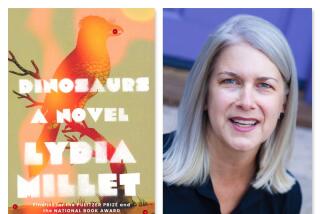The Origin of Darwin : CHARLES DARWIN: A Biography, <i> By John Bowlby (W. W. Norton: $24.95; 511 pp.)</i> : THREE MEN OF THE BEAGLE, <i> By Richard Lee Marks (Alfred A. Knopf: $22; 224 pp.)</i>
- Share via
Darwin’s is an appealing life. At age 22, as official naturalist aboard HMS Beagle, a British naval vessel, he sets out on a five-year voyage around the world. He meets savages in the rocky wastelands of Tierra del Fuego, lives through an earthquake in Chile. He digs up fossils, climbs mountains, savors the sight of towering blue glaciers. In Bahia, he steps ashore into a tropical paradise whose sensual abundance, he writes, “bewilders the mind. If the eye attempts to follow the flight of a gaudy butterfly, it is arrested by some strange tree or fruit. . . . The mind is a chaos of delight.”
His reputation established by the specimens he sends home from South America, Darwin returns to the plaudits of the English scientific world. He marries, settles down, has children--10 of them before he’s through. He works hard all his life, crafting books and scientific articles. He is an exemplary family man, loving, affectionate, kind and considerate--a Victorian boy scout. Though plagued by health problems, he lives into respectable old age--long enough to see his name become a household word, honored by the people and institutions that matter most to him, his ideas making rapid headway against the entrenched ideologies of his age.
He is all that, and modest, too. Endlessly deferential toward his scientific colleagues, he portrays himself as just another hard-working naturalist, poring over his coral or his beetles, equipped with only modest intellectual gifts. “I make slow progress in my work, which is altogether too much for me,” he writes of the book then absorbing his energies. The book was “The Origin of Species,” which set out the doctrine of evolution through natural selection, overturned the thinking of his age, and ranks as probably the most important single book of the 19th Century.
The book was inspired by Darwin’s trip aboard the naval vessel, a voyage adeptly chronicled in Richard Lee Marks’ compelling tale, “Three Men of the Beagle.” Darwin shared a cabin with the ship’s young captain, Robert FitzRoy, a tortured, strong-willed man who later became governor of New Zealand, helped pioneer the science of meteorology and was, all in all, a figure of some note and substance--until he slashed a straight razor across his throat, killing himself at age 59.
In Tierra del Fuego, at the southern tip of South America, FitzRoy, Darwin and the crew encountered a primitive Indian tribe, the Yaghans. FitzRoy brought three of them back to England to Christianize and civilize. One was named Jemmy Button, who, with FitzRoy and Darwin, is the third man of Marks’ title. It is their tangled relationship that is the basis for this rich story, filled with blood, violence, starvation, shipwrecks, and all the other wonderful stuff of a great adventure yarn.
But this yarn is true--most of it, at least. Indeed, Marks’ book almost qualifies as a new subspecies of literature: “history” that does not claim to be exhaustive, spurns all the elaborate refuse of “scholarship,” bears some of the didactic flavor of the traditional fable, and is personal in tone.
Marks--a playwright, novelist and oil-field wildcatter--is always near at hand, spinning his yarn and occasionally appearing himself. “I prefer to get to this place the way I first got there more than forty years ago,” he begins the book, telling of his trip to Tierra del Fuego with his young wife. He concludes it with a hail and farewell to the Three Men: “Sail in the skies, one-time shipmates!”
If Marks’ short book is scarcely a biography at all--call it a luminous little slice of history--John Bowlby’s biography is almost defiantly conventional in tone, relying on long, quoted extracts from letters and not much bent on fashioning scene or dialogue.
Focusing on Darwin’s health, Bowlby argues that repressed feelings in the wake of his mother’s death, when Darwin was 8, led to the pains, fevers, stomach disorders and palpitations that afflicted him all his life. In doing so, Bowlby, a distinguished British psychiatrist who died in 1990, takes issue with, among other oft-heard theories, the speculation that Darwin contracted a parasitic infection while in South America, and that his health problems owed to recurring bouts with it.
Bowlby may be right, but his case is far from overpowering. Often, in seeing psychosomatic origins in Darwin’s physical symptoms, he discerns threads of cause-and-effect that, to lay readers at least, may seem thin indeed. In a letter he wrote while studying at Cambridge University, for example, Darwin mentions a problem with his lips, notes his anxiety about an upcoming examination and registers regret over a recent shooting accident. “Though . . . Darwin does not attribute his symptoms to these two tribulations,” writes Bowlby, “the fact that first one and then the other are described in the same paragraph and immediately following the reference to his lips shows how closely associated they were in his mind.” Bowlby may be right. Yet such compulsive scurrying for the psychic roots of physical ailments shrouded in time may, for some readers, veer too far beyond the kind of imaginative re-creation of a life we seek in biography.
On the other hand, it hardly matters. For when not bogged down in psychosomatic sleuthing, his story is compelling, his choices of incident and quotation intelligent, his portrait of Darwin as an individual, as a family man and as a member of the scientific circles of his day, rich and finely textured.
If it were just the adventures aboard the Beagle, the encounters with the Indians and Darwin’s exploration of the Galapagos Islands that held our interest, less merit might accrue to the author’s telling. But Darwin’s domestic life, which for 40 years didn’t range very far from Down House, his home in Kent about 15 miles from London, is just as interesting. These pages run over with warmth, quiet and high-minded intellectual endeavor.
It is testimony to the power and myriad variousness of books that these irreconcilably different ones, linked only by Darwin and the Beagle, could each be such fine and satisfying literary experiences.
More to Read
Sign up for our Book Club newsletter
Get the latest news, events and more from the Los Angeles Times Book Club, and help us get L.A. reading and talking.
You may occasionally receive promotional content from the Los Angeles Times.









